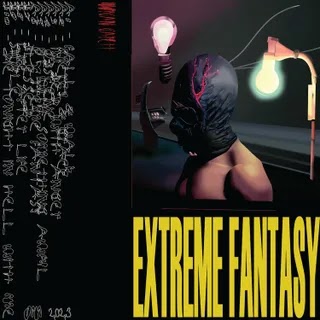On their 15th album, the indie-rock institution goes apocalyptic with their first concept record.
On Future Teenage Cave Artists, Deerhoof fantasize about a future that feels frighteningly real. Populations evacuate their homes for greener pastures. People and animals are murdered senselessly. Survival is a privilege, not an assumption. Amidst this chaos, a new generation of teenagers still discover and make art, experiencing feelings as old as time.
From the first track, the world is fractured, brutal and basically over. Satomi Matsuzaki delivers the album’s opener, also its poppiest gesture, from the perspective of a hopeful, doomed adolescent: “Gonna paint an animal on a cave wall/Gonna leave it there forever while empires fall.” Greg Saunier’s snare-dense drumming is at its least busy, leaving space for listeners to share the teen’s excitement. Rapidly, the album fills up with dissonance and cluttered hooks, evoking a future in which humans are both overstimulated and denied the fulfillment of basic necessities. Matsuzaki’s one-liners are typically incisive (a few favorites: “Try my sci fi!” “Why would you kill my bambis?” “Cowboys were just a corporate invention”) and Saunier sings on a number of the tracks, his breathy, complementary voice never detracting from Matsuzaki’s singular, commanding persona.
This might be Deerhoof’s first overt concept album, but in every other regard, it fits comfortably into their well-worn blueprint. John Dieterich and Ed Rodriguez write guitar melodies that are both gorgeous and guarded; Matsuzaki mangles and tweaks pop convention with dogged use of her upper vocal range. The lyrics occupy the same magically realistic, culturally wide-eyed space that the group has been exploring since it began in the 1990s.
This formula could make Deerhoof seem like a machine too well-oiled to keep surprising us—even if the band loves to claim that they reinvent themselves with each album, a perception that seems more and more like a fallacy with each new release. True, the indie rock collective have taken detours within their expanded universe: they released an EP covering The Shining’s soundtrack, put out an excellent collaboration with the classical ensemble Del Niente, and brought in Awkwafina to rap on their revivifying 2017 album Mountain Moves. But Deerhoof are committed to being a band, while somehow never seeming nostalgic or close-minded to the world outside of rock ‘n’ roll: their four-piece is like a nuclear family that stays together as the indie scene that birthed them falls apart.
On the album’s cover, which Matsuzaki drew, a smartphone burns a kneeling teenager in the light of its camera. Appropriately, much of Future Teenage Cave Artists was recorded on laptops and phones, a tech-forward simplicity that reflects the album’s scrappy and cataclysmic milieu. It sounds less polished than their last couple of albums, but never as raw as their recently reissued early oeuvre.
Future Teenage Cave Artists surprises us with a sudden shift at its very end, which also brings the implicit themes of apocalypse into relief. “Damaged Eyes Squinting into the Beautiful Overhot Sun” is the record’s peak, its dynamic sound built on Deiterich’s three-chord rhythm guitar part and Rodriguez’s ascending riff, which swells before the song stops abruptly, as though the sun just absorbed the earth. Listeners are left with a stark performance of a Bach choral prelude on solo piano. This conclusion raises a bunch of questions—what does it mean for an apocalyptic album to end with a prelude? Why does a narrative about the artistic awakening of juveniles terminate with a centuries-old work? Is there hope for music after the madness of human self-destruction? In Future Teenage Cave Artists’ hectic, crammed-to-the-brim structure, Johann Sebastian gives Deerhoof listeners something they have been methodically denied: space to process the music. We’re left contemplating how a rock band, 26 years into their career, have managed to not only pin down the chaos of our time, but also to point toward our uncertain future.
View the original article here
















0 comments:
Post a Comment